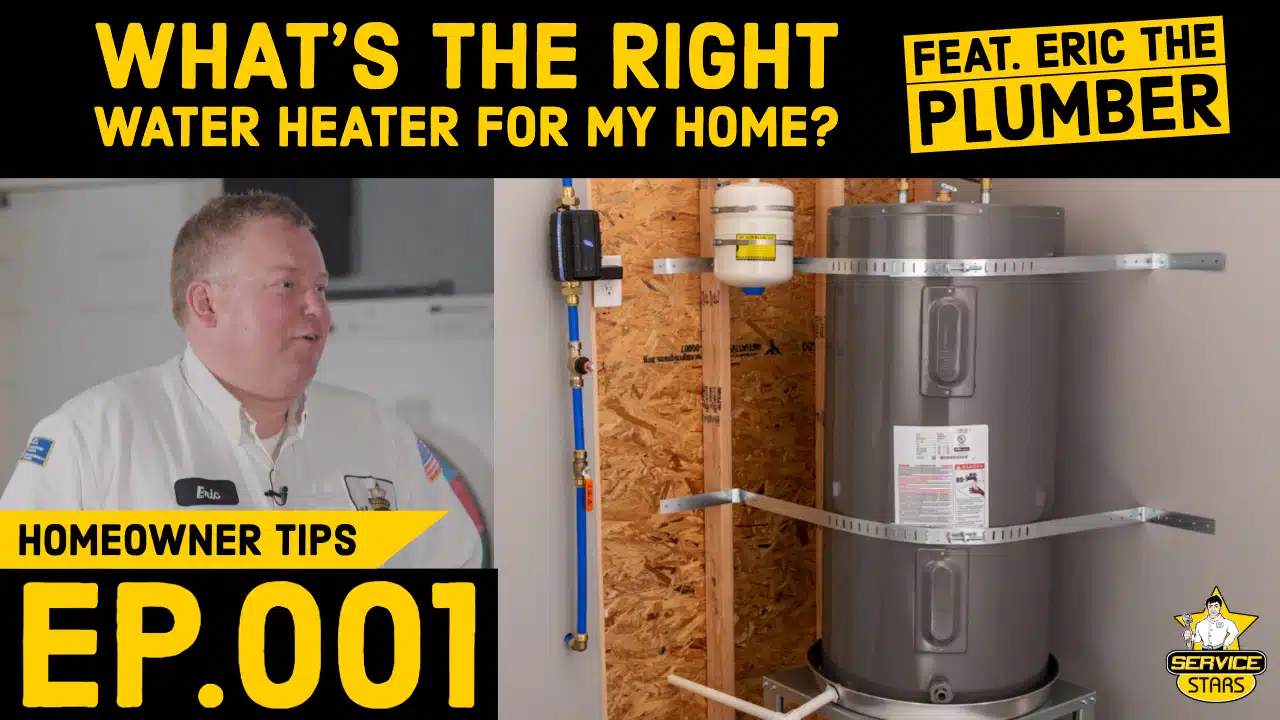The Top 5 Things EVERY Homeowner Should Know!
Summary: We can all agree: homeownership is a huge responsibility. Whether you live by yourself, with a spouse, or an entire family, owning your own place comes with its share of upkeep. There’s plenty of things that you have to keep on top of when maintaining your home, so we wanted to help by letting you know our top 5 things we think EVERY homeowner should...

We can all agree: homeownership is a huge responsibility. Whether you live by yourself, with a spouse, or an entire family, owning your own place comes with its share of upkeep. There’s plenty of things that you have to keep on top of when maintaining your home, so we wanted to help by letting you know our top 5 things we think EVERY homeowner should know. And we mean EVERY homeowner; no exceptions.
1. Where your water main shut-off valve is in the home and make sure it works.

Imagine this scenario in your head: It’s midnight in the cold winter months. Record-breaking low temperatures are hitting the area. You’re awakened by the sound of rapidly flowing water coming from somewhere… A frozen pipe that burst is flooding your home! What’s the first thing you should do? Turn the water main off! But where do I find that..?
This situation is one that we hope never happens to anyone but is very possible without the right preparations. As a homeowner, it’s important to know where the water main shut-off valve is in the event of emergencies.
Knowing where it is can be the difference between a wet floor and several dollars in damages. Every home is unique, so the location of the shut-off will vary; learn where yours is.
However, just as a certain old cartoon about military action figures once said, knowing is half the battle. The other half is making sure the shut-off actually works.
This is usually a non-issue in new homes; however, it can be in older ones. We’ve had a number of instances where we inspected clients with older homes (30+ years) and found the water main shut-off valve had seized up from the elements or not being touched for decades. We also find some actually leaking and ready to fail. That’s never a good time for anyone.
Water shut-off valves are NOT a lifetime part and should be changed as soon as signs of failure are visible. Since they are constantly under high water pressure, they can wear down, even if you haven’t turned it on/off in years.
Expected lifespans of these valves are about 8-10 years, so if you haven’t touched your shut-off valve longer than that, it’s worth checking with a professional plumber to see if it needs to be replaced. One of our plumbers Eric has helped us prepare a video to guide you through the steps of turning on/off your water main and what to look out for. Take a quick look!
2. Your home system’s maintenance schedule and sticking to it.
“I don’t see why I should spend more money on my A/C. It’s been working perfectly fine the past few years.”
“A plumbing inspection? Why? Nothing is leaking so I’m pretty sure we’re good.”
“I swear, I’ve lived in this house for decades and nothing has ever gone wrong with the electrical system.”
These are just a handful of quotes we hear regularly with some clients. And we get it; why spend more money when nothing needs a repair? Well unfortunately, these systems do not last forever. (It would be nice though!)
Treating our home’s systems like a car helps us better understand why having a regular maintenance schedule is important. With a car, having regular maintenance such as oil changes, alignments, brakes inspected, etc. contribute to a long healthy operating lifespan. There are even news articles on old cars that have reached over a million miles driven!
That definitely would not have been achievable if regular maintenance wasn’t involved. On the contrary, a brand new car would probably not last longer than a year or two if maintenance is completely ignored. What sounds cheaper: an oil change a year or a whole engine replacement every other year?
With that said, the same logic rings true with our home’s systems as well. Let’s take the lifespan of a residential boiler for example. They are estimated to keep on running for 10-15 years. We can confidently say those several years of operating are impossible without regular maintenance.
We’ve seen poorly maintained boilers that died out after less than 5 years. We’ve also seen quite a few well-maintained ones that are old enough to obtain retirement benefits. (Nearly 70+ years old!) What sounds cheaper to you: a boiler tune-up once a year or a brand new boiler every few years?
3. Home systems are an investment; you get what you pay for. Get what’s right for your home and your budget.
Let’s not beat around the bush here; home systems can be expensive. Because of that, it can be enticing to cheap out and save a pretty penny going for the bottom-line products. They all do the same thing after all, right? Not exactly… Let me explain.
One thing to remember is that your home systems are what make your home more than just a shelter to sleep in at night. HVAC units keep your home cool during the summer and warm during the winter. Proper plumbing keeps clean water flowing in and dirty water out. Electrical work powers on everything electronic device in the home, from charging your phone to keeping food fresh in the fridge.
They tend to be what we feel are necessities in our modern age. Whenever one of these things break down, we really feel it in our everyday life.
Our recent storms last month knocked out power all around Connecticut and many residents went powerless for several days. You and your family may have been one of the many homes stuck in the dark.
While it’s out of our control for natural disaster occurrences like that storm, we do have complete control of what systems are running in our homes.
Not all systems are created equal. While their purpose may be the same, the quality will vary between different brands and their product lines. The cheapest bottom-line systems are priced cheap for a reason: they skimp on quality to save both the homeowners and manufacturers money.
What results is a lower up-front cost when purchasing and installing the system, but a potentially higher chance of failure and expensive repair bills. Not to mention loss of that service until it gets fixed or replaced. A broken A/C in the hot summer days just sucks.
We don’t recommend aimlessly buying the most largest and expensive systems you can get your hands on. What we do recommend is to consult with a professional technician to find the “Goldilocks” systems for your home.
Service Stars does just that for residents in the Fairfield County, Connecticut. If you’re outside the service area, we highly recommend finding a home service company that prioritizes quality and safety for your home.
4. The basic layout of your home’s electrical panel.
You’ve likely been in front of the electrical panel for your home for one big reason: resetting a tripped breaker. To some of you reading this, resetting the breaker may be the easiest thing in the world. However, with the number of calls we’ve gotten over the years in regards to a tripped breaker, I felt it was worth the mention.
With a majority of our clients, the quick off/on toggle on the tripped breaker was all that’s needed. The question they all had wasn’t exactly how to do it, but rather how to know which one was the tripped one. And we don’t blame them; a small box of what feels like a million switches can be very intimidating to the non-electrician eye.
What happens if I pick the wrong one? Will I accidentally short circuit something? How can I even tell what’s the right switch to flip? To answer these questions, our electrician Justin helped up prepare this video for homeowners on what to do when a breaker trips! Check it out here.
Every once in a while though, we come across cases where a breaker constantly tripping revealed a much bigger problem. When the client calls us to the home to diagnose the issue in these scenarios, we find the mentioned problem to be way out of hand for an average homeowner to handle themselves.
Consulting a professional electrician is highly recommended if you feel the problem with your panel is much more than a simple breaker reset. As mentioned earlier in this post, not all systems last forever. Check out this breaker that ended up catching fire in a client’s home: 
This was due to a poor faulty wiring job from a previous contractor that the client had hired. A rare case but things like this do happen. It’s a good practice to pay attention for anything that may seem off on your panel. (No pun intended.)
For this homeowner, an odd burning smell is all it took to call our electricians Justin and Kelvin in. If it had gone unnoticed, the homeowner may have had a rude awakening one day to the sight of fire in the home. Thankfully, it didn’t escalate any further.
5. Your go-to professional home service company in your area.
To wrap up this post, we highly recommend choosing a home service company that you can put complete trust in. It’s your home; wouldn’t you want it in the right hands? If you’ve already found that company, then you’re already one step ahead in maintaining your home. If not, then we strongly urge you to start looking!
Read reviews, ask friends on social media, and give a few different companies a try. They can be a big company or they can be a small local business (which we highly recommend supporting!).
You want to look for the perfect fit for you and your home. Some of the uncertainties of homeownership are alleviated when you know you’ve got a professional team of technicians ready to help you out in an emergency.
Thanks for joining us on our first real post for The Homeowner’s Guide! It’s a first for us to be blogging like this, so we hope that this post brought some sort of value to you. Keep an eye out for next Friday’s post! ⭐️


